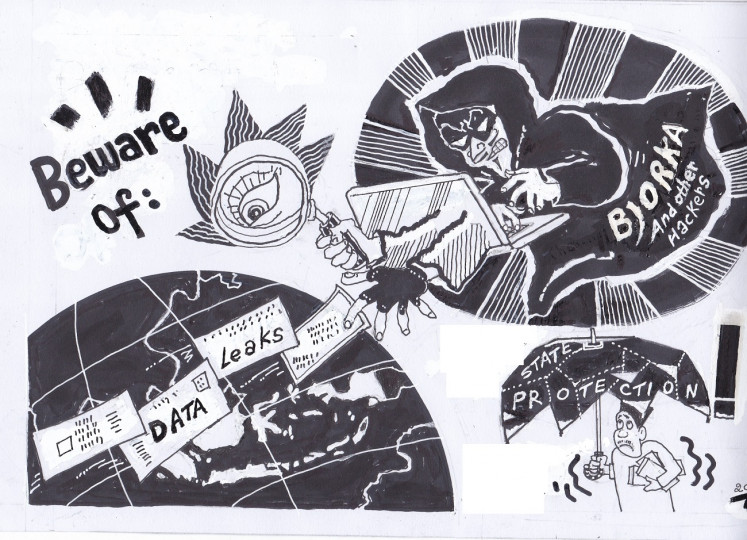Popular Reads
Top Results
Can't find what you're looking for?
View all search resultsPopular Reads
Top Results
Can't find what you're looking for?
View all search resultsDomestic finance won't cost the Earth
Like the Joko “Jokowi” Widodo government, which has set the challenge of bringing power to the people, top of the wish list of these major financial players was sustainable growth for Indonesia driven by sustainable power supplies.
Change text size
Gift Premium Articles
to Anyone
W
hen 2016 drew to a close, Indonesia’s chief finance sector regulator, the Financial Services Authority (OJK), met in Bali with the private-sector finance arm of the World Bank, the International Finance Corporation (IFC), to come up with some shared new year’s resolutions for the national banking sector.
Like the Joko “Jokowi” Widodo government, which has set the challenge of bringing power to the people, top of the wish list of these major financial players was sustainable growth for Indonesia driven by sustainable power supplies.
The best way to do so, they agree, is to provide a clear pathway, which meets the country’s climate change pledges and builds the Indonesian banking sector’s capability to provide the money required, because of course, lighting up every home comes at a cost.
Today, there is a real question of whether the price being paid is too high.
Currently, domestic banks are supplying little of the money required to build the Indonesian energy system. It comes instead from overseas, particularly from Japan, Korea and China.
And this is not necessarily in Indonesia’s best interests. Take the example of deals involving the Japanese export credit agency, the Japan Bank for International Cooperation (JBIC).
The main objective for his state-owned export credit agency is to increase the sale of Japanese products abroad. In fact, it will only provide finance when Japanese companies stand to benefit.
And in the case of energy systems, this is more likely than not to mean Indonesia purchasing the heavy equipment exported by Japanese companies to build carbon-intensive coal-fired power stations.
At the moment, the market is eyeing the pending financial close of two major coal power transactions: the 2,000 MW Tanjung Jati B (TJB) Units 5&6 and 1,000MW Cirebon 2 projects.
Both have Japanese sponsors, Sumitomo Corporation in the case of TJB and Marubeni Corporation and Chubu Electric in the case of Cirebon 2. Both have committed funding from JBIC and a host of Japanese commercial banks.
The debt, denominated in US dollars, amounts to about US$3 billion for TJB, and $1.5 billion for Cirebon 2. As a consequence, Indonesia is increasing foreign debt to buy foreign products.
Private sector-led power projects borrow in US dollars and import most equipment. Local banks are yet to have the ability to lend long-tenor US dollar loans. That is a sting in the tail in that these deals are made not in rupiah but in US dollars.
This matters because it leaves the country vulnerable to the fluctuations in the US dollar, meaning when the value of the dollar goes up, Indonesia finds itself even more indebted than it had bargained for.
And since foreign currencydenominated loans already supported about 30 percent of Indonesia’s gross domestic product as of mid-December according to economic research consultancy Capital Economics, more US dollar debt is bad news.
According to media reports, state power utility PT Perusahaan Listrik Negara (PLN) bills its customers in rupiah, but it needs about $600 million in foreign currency every month to pay local coal miners and power producers and to service its loans.
The rupiah has come down by almost 7 percent against the US dollar since the beginning of 2015 and this has been put into sharper focus with the election of Donald Trump as US President.
His plans for tax cuts and “huge” infrastructure spending in the US are driving the scenario of an appreciating dollar.
The right course of action for Indonesian government is to cut back on dollar-based foreign transactions and build capacity for domestic banks to supply these loans.
To President Jokowi’s credit, steps are already being taken in the right direction. The Indonesian government has introduced new regulation requiring the use of the rupiah to pay for domestic transactions, including the tariff, since July 1 2015.
This has made US-dollar denominated loans from abroad for power projects riskier, as there is a currency mismatch — loans in one currency, and revenue generated to repay the loan — the tariff that is — in another.
Not only will this government measure help reduce reliance on foreign currency, it will also, in time, enable local banks to finance private power projects.
To cap it all, as the finance bodies resolved in Bali to incorporate rigorous environmental and social standards along with increased capacity, domestic banks can draw on greater local knowledge to navigate the myriad of risks involved in new power projects, helping them to work in the best interests of everyone from the consumer to the state-owned utility, PLN.
The government has also made the right move in reiterating its commitment to reduce greenhouse gas emissions by 29 percent and increase the level of renewable sources in the energy mix by 23 percent by 2025.
This is important, because rather than pushing ahead with foreign-funded coal projects, home grown clean energy can be at the core of a modern world class power system. In this way, if Indonesian banks can be supported to provide the finance, it needn’t cost the earth.
---------------
We are looking for information, opinions, and in-depth analysis from experts or scholars in a variety of fields. We choose articles based on facts or opinions about general news, as well as quality analysis and commentary about Indonesia or international events. Send your piece to community@jakpost.com. For more information click here.










